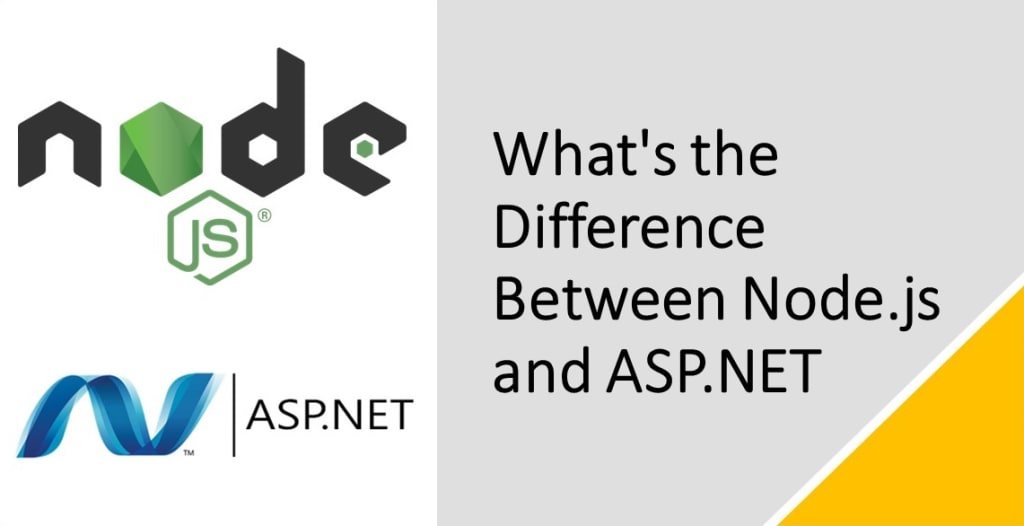What's the Difference Between Node.js and ASP.NET: A Comprehensive Comparison
Explore the differences between Node.js and ASP.NET

Introduction
In the fast-paced world of web development, staying up-to-date with the latest technologies is crucial. Two prominent players in this arena are Node.js and ASP.NET. While both serve as powerful tools for building web applications, they possess distinct features that cater to different requirements. This article delves into the intricacies of Node.js and ASP.NET, highlighting their differences, use cases, and benefits.
What's the Difference Between Node.js and ASP.NET?
Node.js and ASP.NET are both widely used frameworks for web development, but they differ in several key aspects.
Let's explore these differences between Node.js vs. ASP.NET in detail:
Node.js: JavaScript on the Server-side
Node.js is an open-source, cross-platform runtime environment that allows developers to execute JavaScript code on the server side. It employs an event-driven, non-blocking I/O model, making it particularly suitable for building real-time applications and APIs. Node.js leverages the Chrome V8 engine, known for its speed and performance, enabling developers to create highly responsive applications. With a strong focus on scalability, Node.js excels in handling a large number of concurrent connections.
ASP.NET: Microsoft's Web Framework
On the other hand, ASP.NET is a web framework developed by Microsoft. It supports various programming languages, including C# and F#, and offers a range of tools for building dynamic web applications, APIs, and services. ASP.NET follows a modular architecture and provides a comprehensive set of libraries for tasks such as data access, authentication, and caching. It seamlessly integrates with other Microsoft technologies, making it an excellent choice for enterprises heavily invested in the Microsoft ecosystem.
Use Cases: When to Choose Node.js or ASP.NET
When deciding between Node.js and ASP.NET, considering the specific use case is crucial. Here's when each framework shines:
Node.js Use Cases
Real-time Applications: Node.js' event-driven architecture makes it ideal for building real-time applications like chat applications, online gaming platforms, and collaborative tools. Its ability to handle multiple connections simultaneously ensures a smooth user experience.
Microservices: Node.js' lightweight nature and fast execution make it a popular choice for building microservices architecture. It allows developers to create independent, scalable services that work together seamlessly.
Single-Page Applications (SPAs): For SPAs that require quick data updates without page reloads, Node.js' asynchronous capabilities prove advantageous. It facilitates the creation of dynamic interfaces and enhances user engagement.
ASP.NET Use Cases
Enterprise Applications: ASP.NET's integration with Microsoft technologies like Azure, SQL Server, and Visual Studio makes it an excellent choice for building large-scale enterprise applications. Its robust security features and scalability are well-suited for corporate environments.
Content Management Systems (CMS): When developing content-rich websites or CMS platforms, ASP.NET's versatile libraries and tools simplify tasks such as content creation, storage, and distribution.
Windows-Exclusive Environments: If your project requires tight integration with Windows services and applications, ASP.NET's compatibility with Windows environments ensures seamless communication and resource sharing.
Performance and Scalability: Node.js vs. ASP.NET
Performance and scalability are critical considerations when selecting a web development framework. Let's evaluate how Node.js and ASP.NET compare in these aspects:
Node.js Performance
Node.js' event-driven architecture and non-blocking I/O model contribute to its exceptional performance. It can handle a high volume of concurrent connections with low memory usage, making it suitable for applications requiring real-time data processing.
ASP.NET Performance
ASP.NET's performance is optimized when used with the .NET Core framework. It offers high-speed execution and efficient memory management, ensuring fast response times for applications even under heavy loads.
Community and Ecosystem
Both Node.js and ASP.NET have vibrant communities and ecosystems that provide valuable resources, libraries, and tools for developers:
Node.js Community
Node.js boasts a large and active community that continuously contributes to its growth. The Node Package Manager (NPM) provides access to a vast collection of reusable modules, simplifying development tasks and accelerating the project's pace.
ASP.NET Community
ASP.NET benefits from Microsoft's extensive support and resources. The Visual Studio IDE offers a user-friendly environment for development, and the Microsoft Developer Network (MSDN) provides a wealth of documentation and tutorials.
Integration and Compatibility
Integration with other technologies and platforms is a significant factor when choosing a web framework:
Node.js Integration
Node.js integrates seamlessly with various third-party services and APIs, making it versatile for integrating with different systems. Its compatibility with JavaScript libraries enhances its capabilities for front-end development.
ASP.NET Integration
ASP.NET is closely integrated with Microsoft's ecosystem, allowing easy interoperability with technologies like Azure, Office 365, and Windows services. This makes it a preferred choice for organizations reliant on Microsoft solutions.
FAQs
Can I use Node.js with Microsoft technologies?
Yes, Node.js can be integrated with Microsoft technologies. While it's not a native fit, tools like Edge.js enable communication between Node.js and .NET languages.
Is ASP.NET Core the same as ASP.NET?
ASP.NET Core is a cross-platform, high-performance framework and is not the same as the traditional ASP.NET framework. ASP.NET Core offers enhanced modularity and performance.
Which framework is better for real-time applications?
Node.js is better suited for real-time applications due to its non-blocking I/O model and event-driven architecture.
Does ASP.NET only work with C#?
No, ASP.NET supports multiple programming languages, including C#, F#, and Visual Basic.
Can I develop Windows applications with Node.js?
While Node.js is primarily used for web development, tools like Electron allow developers to build desktop applications using web technologies.
Is Node.js or ASP.NET more suitable for microservices architecture?
Node.js is often favored for microservices architecture due to its lightweight nature and efficient handling of asynchronous tasks.
Conclusion
In the dynamic landscape of web development, choosing the right framework depends on various factors such as project requirements, scalability needs, and familiarity with programming languages. Node.js excels in real-time applications and microservices, while ASP.NET is a strong contender for enterprise applications and Windows-centric projects. Both frameworks offer unique advantages, so the decision ultimately boils down to aligning the framework's strengths with your development goals.
About the Creator
Miles Brown
I'm Miles Brown, a Programming & Technology professional with expertise in using various technologies for software & web development @Positiwise Software Pvt Ltd, a leading technology solution for Software Development & IT Outsourcing.






Comments
Miles Brown is not accepting comments at the moment
Want to show your support? Send them a one-off tip.